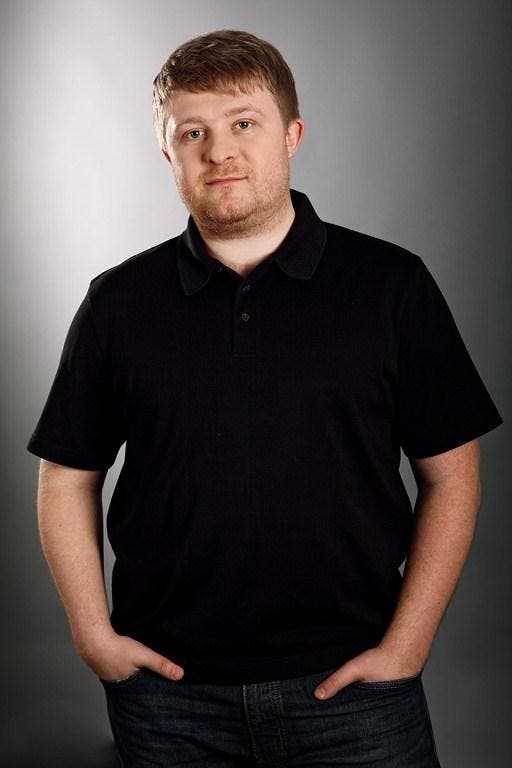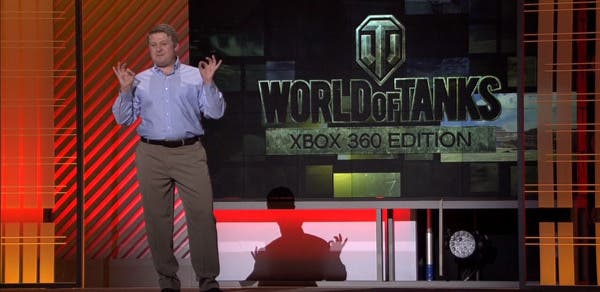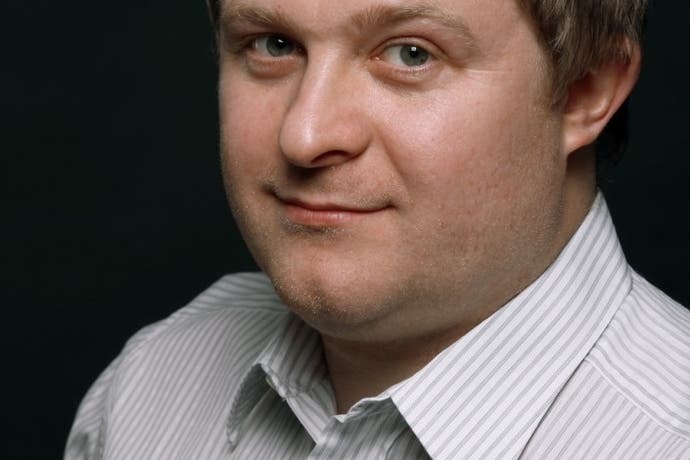The Russian invasion: Meet the man bringing free-to-play to Xbox
Wargaming.net takes the F2P war to the console front.
Had Victor Kislyi, CEO of Wargaming.net, been born in an earlier, Colder era, he would have made a formidable Russian General. This graduate in laser physics cuts a commanding figure as he sits straight and vigilant in a white leather chair, fists resting for emphasis on the surface of vast, sweaty table. He gestures towards the wall behind, thickly papered with a world map. It's punctuated by a flurry of red dots, each one signifying the location of one of Wargaming.net's global offices. "Right now we are 1600 people," he says in a gloopy Russian accent. "We have bases in Sydney, Tokyo, Singapore, Paris, Berlin, and so on. Probably the only untouched territories remaining are Latin America and Brazil. We are almost everywhere. And, of course, we have further plans."
For Kislyi the video game business is war. It's war at every level, in fact, from the virtual battlefields upon which players skirmish daily in his company's most successful game, World of Tanks, to this, the grim theatre of E3, the video game convention where we meet in a stuffy, branded bunker. For the past three years Kislyi has commanded the Wargaming.net campaign to many victories. This much is evident in the numbers: today his game boasts 60 million registered players on PC. But officers like Kislyi are never satisfied unless gaining new ground. Now he is ready to take the war to a new front as World of Tanks prepares to invade a console.

"In the US, the UK and part of Europe the people are mostly playing on the consoles," he says. "So we have to go where the customer is." 18 months ago Wargaming acquired the Chicago-based Day One Studios for $20 million, rebranded the developer as Wargaming West and tasked it with bringing World of Tanks to Xbox 360. 18 months later, the game has trundled into beta on the console, carrying with it both hopes and risks. For Wargaming, it's the company's first concerted assault on Xbox 360's "juicy" 48 million strong userbase, and a chance to greatly swell its player ranks. For Microsoft, the hope is that World of Tanks will be this year's Minecraft, a game that's proven its popularity in the PC wilds and one that's ripe for redoubled success in the living room.
Nevertheless, the World of Tanks phenomenon has a vastly different shape and character to Minecraft. Alongside League of Legends, this competitive combat game has led the free-to-play revolution on PC, a monetisation strategy that will remain unchanged for the Xbox version. "It did take a lot of our efforts to convince Microsoft that free-to-play was something worth doing on Xbox," says Kislyi. "But it will be a historical moment when the first huge free-to-play game arrives on consoles," he says. "It's the beginning of a new era. And Microsoft will understand that when they see the first cheque..."
Microsoft may understand, but Xbox players will take more convincing of the financials. On consoles, free-to-play games are at best viewed with suspicion, at worst seen as a monetary trap designed to ensnare unwitting players through nefarious means. "When we and Riot games started evangelising free-to-play in the West we were met with a huge amount of resistance from both the media and consumers," says Kislyi. "But that is changing." He pauses momentarily then bangs the table, punctuating each word for effect: "We will push free-to-play hard. No choice."
Today Kislyi's preoccupation appears to be with the expansion of a business empire. He spouts boastful statistics at every opportunity. Many game-makers fret over the medium's artistic legitimacy. For Kislyi, validation is written not in the opinions of cultural critics, but rather in cold numbers. It wasn't always this way.
Kislyi was born in Minsk, Belarus during the Soviet years. While studying laser physics he and his friends played "everything on Spectrum" and, when he bought an IBM-compatible PC, games such as Civilization, Sim City, Dune 2 and Warcraft - the "usual man stuff", as he puts it. "I'd be playing and would see all these ways in which I wanted to make the games better," he says. "I wrote a letter to Sid Meier with a list of suggested improvements, although it probably never reached him." At some point the armchair designer decided to make his hobby a vocation. He explains: "I truly wanted to make 'the game of all times'."
“It did take a lot of our efforts to convince Microsoft that free-to-play was something worth doing on Xbox. It's the beginning of a new era. And Microsoft will understand that when they see the first cheque…”

Kislyi's first game was anything but 'the game of all times'. It was, in his words, "Risk meets Panzer General" and "went nowhere". After graduating from university, he and his friend made DBA Online, a historical wargame influence by Civilization on which you control armies through the centuries. Its success provided the team with enough capital to develop its next title, Massive Assault. From there the victories came quickly, accompanying by an expansion of both business and ambition. But Kislyi maintains that his interest remains in the art of games as much as the business opportunity they present. Before I can finish a question about where his passion lies, he interrupts: "I have played 11,000 games of World of Tanks since its release."
Those numbers again. I press a little harder into the statistics. Of the 60 million World of Tanks players that Wargaming.net boasts, how many are active users? "You cannot make everyone play your game forever," he says, abandoning his previous braggadocio. "Some come and play for a couple of days then go forever. Other times they come back." So, the 60 million? "That is the total number of registered accounts we have from past three years."
As Kislyi is in a revelatory mood, I ask for some of the figures that free-to-play game publishers usually hide from the press. For example, for how long do players play World of Tanks? "The average is three hours per day," he says. I explain that I was referring to how long the average player plays before moving onto other games. "That's the tricky part," he says. "We started in Russia. Many people there played for 3 years. But some people leave after a few days. We have a core that stays... well, pretty much forever." And what is the average player spend in the game? "The global average is $7 per active user every month," he says. "It differs from territory: the US is higher while China is lower. Japan is the highest of all."
World of Tanks is just one of the titles in Wargaming.net's arsenal. World of Warships and, most recently, World of Warplanes expand the fight to the other armed forces. But does Kislyi have any other games he wants to make? Is there, somewhere within him, the urge to create a different sort of video game? "Absolutely," he says. "I want to be making one new game every year. It could be a historical war-game. Or a science fiction war-game, with walking robot tanks. The possibilities are endless."

